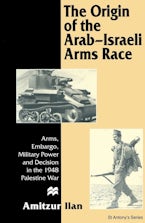On May 29, 1948, two weeks after five regular Arab armies invaded Palestine in an attempt to erase the lately established Jewish state, the UN Security Council imposed an embargo, which banned the supply of arms, war materials, and other forms of military aid to the parties directly involved in the Palestine conflict. During the embargo the Arab-Israeli war was fought and decided, and the concluding armistice of 1949 between the rival parties marked a new era in the history of the Middle East.
What, Amitzur Ilan asks, was the link between the UN embargo and the conclusion of the war, and how did the concluding armistice mark a new era in the history of the Middle East? Defining four important junctures of the war, Ilan looks at the real (as opposed to stated) Orders of Battles for both sides and points out the immense impact of the embargo on the decline of military capability of the Arabs and the Israelis, and at the same time depicts the relative advantage it created in Israel's favor.
Employing a large number of Israeli, British, American, and Czech documents, The Origin of the Arab-Israeli Arms Race provides an excellent point of departure for those wishing to understand the actions that created and fed the arms race between the Arabs and Israelis.

